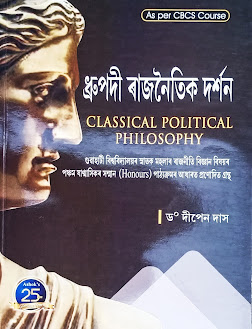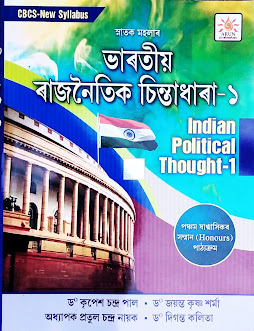@FYUGP-NEP Syllabus
| গোট | Paper Code: POL-0500104 (Paper 9) |
|---|---|
| গোট-১ | প্ৰাচীন ৰাজনৈতিক চিন্তাধাৰা: (ক) কৌটিল্য: রাষ্ট্রৰ তত্ত্ব (খ) মনু: সামাজিক আইন |
| গোট-২ | মধ্যযুগীয় ৰাজনৈতিক চিন্তাধাৰা: (ক) জিয়াউদ্দিন বৰণী: আদৰ্শ ৰাজনীতি (খ) আবুল ফজল: শাসন আৰু প্ৰশাসন |
| গোট-৩ | আধুনিক ৰাজনৈতিক চিন্তাধাৰা: (ক) ৰাজা বামমোহন ৰায়: সংস্কাৰবাদী ধাৰণা (খ) গান্ধী: স্বৰাজ; সত্যাগ্ৰহ; আধুনিক সভ্যতাৰ সমালোচনা (গ) নেহৰু: ধৰ্মনিৰপেক্ষতা, সমাজবাদ |
| গোট-৪ | ভাৰতীয় ৰাজনৈতিক চিন্তাধাৰা আৰু জাতি, শ্ৰেণী আৰু লিঙ্গ: (ক) আম্বেদকাৰ: জাতি বিষয়ক দৃষ্টিপাত (খ) লোহিয়া: সমাজবাদ (গ) তাৱবাই ছিন্দে: পিতৃতন্ত্ৰ আৰু জাতি |
| গোট | Paper Code: POL-050004 (Paper 11) |
|---|---|
| গোট-১ | তুলনামূলক ৰাজনীতিৰ পৰিচয় (ক) অৰ্থ আৰু প্ৰকৃতি (খ) তুলনামূলক পদ্ধতি (গ) তুলনামূলক ৰাজনীতি বোধৰ বাবে পৰম্পৰাগত আৰু আধুনিক দৃষ্টিভংগী |
| গোট-২ | ব্রিটিছ সংবিধানৰ পৰিচয়ঃ (ক) ইতিহাস, চলিত প্ৰথা বা পৰম্পৰা, বৈশিষ্ট্যসমূহ (খ) ৰাজতন্ত্র (গ) সংসদ (ঘ) প্ৰধানমন্ত্ৰী আৰু কেবিনেট |
| গোট-৩ | আমেৰিকা যুক্তৰাষ্ট্ৰ সংবিধানৰ পৰিচয়ঃ (ক) ইতিহাস আৰু বৈশিষ্ট্যসমূহ (খ) ৰাষ্ট্ৰপতি আৰু কংগ্ৰেছ (গ) সৰ্বোচ্চ ন্যায়ালয় (ঘ) যুক্তৰাষ্ট্ৰবাদ |
| গোট-৪ | ছুইজাৰলেণ্ডৰ সংবিধানৰ পৰিচয়ঃ (ক) ইতিহাস আৰু বৈশিষ্ট্যসমূহ (খ) ফেডাৰেল কাউন্সিল আৰু দ্য ফেডাৰেল এছেম্বলী (গ) চুইছ ফেডাৰেচন (ঘ) ফেডাৰেল ক'ৰ্ট |
-------------------------------------------------------
-------------------------------------------------------
POL HC 5016 Classical Political Philosophy
--------------------------------------------------------
READING LIST
I. Text and Interpretation
Essential Readings:
T. Ball, (2004) ‘History and Interpretation’ in C. Kukathas and G. Gaus, (eds.) Handbook of
Political Theory, London: Sage Publications Ltd. pp. 18-30.
B. Constant, (1833) ‘The Liberty of the Ancients Compared with that of the Moderns’, in D.
Boaz, (ed), (1997) The Libertarian Reader, New York: The Free Press.
Additional Readings:
J. Coleman, (2000) ‘Introduction’, in A History of Political Thought: From Ancient Greece to
Early Christianity, Oxford: Blackwell Publishers, pp. 1-20.
Q. Skinner, (2010) ‘Preface’, in The Foundations of Modern Political Thought Volume I,
Cambridge: Cambridge University Press pp. ix-xv.
II. Antiquity:
Plato
Essential Readings:
A. Skoble and T. Machan, (2007) Political Philosophy: Essential Selections. New Delhi:
Pearson Education, pp. 9-32.
R. Kraut, (1996) ‘Introduction to the study of Plato’, in R. Kraut (ed.) The Cambridge
Companion to Plato. Cambridge: Cambridge University Press, pp. 1-50.
C. Reeve, (2009) ‘Plato’, in D. Boucher and P. Kelly, (eds) Political Thinkers: From Socrates
to the Present, Oxford: Oxford University Press, pp. 62-80
Additional Readings:
S. Okin, (1992) ‘Philosopher Queens and Private Wives’, in S. Okin Women in Western
Political Thought, Princeton: Princeton University Press, pp. 28-50
R. Kraut, (1996) ‘The Defence of Justice in Plato's Republic’, in R. Kraut (ed.) The
Cambridge Companion to Plato.Cambridge: Cambridge University Press, pp. 311-337
T. Saunders, (1996) ‘Plato's Later Political Thought’, in R. Kraut (ed.) The Cambridge
Companion to Plato.Cambridge: Cambridge University Press, pp. 464-492.
Aristotle
Essential Readings:
A. Skoble and T. Machan, (2007) Political Philosophy: Essential Selections. New Delhi:
Pearson Education, pp. 53-64.
T. Burns, (2009) ‘Aristotle’, in D. Boucher, and P. Kelly, (eds) Political Thinkers: From
Socrates to the Present. Oxford: Oxford University Press, pp.81-99.
C. Taylor, (1995) ‘Politics’, in J. Barnes (ed.), The Cambridge Companion to Aristotle.
Cambridge: Cambridge University Press, pp. 232-258
Additional Readings:
J. Coleman, (2000) ‘Aristotle’, in J. Coleman A History of Political Thought: From Ancient
Greece to Early Christianity, Oxford: Blackwell Publishers, pp.120-186
D. Hutchinson, (1995) ‘Ethics’, in J. Barnes, (ed.), The Cambridge Companion to Aristotle
Cambridge: Cambridge University Press, pp. 195-232.
III. Interlude:
Machiavelli
Essential Readings:
A. Skoble and T. Machan, (2007) Political Philosophy: Essential Selections. New Delhi:
Pearson Education, pp. 124-130
Q. Skinner, (2000) ‘The Adviser to Princes’,inMachiavelli: A Very Short Introduction,
Oxford: Oxford University Press, pp. 23-53
J. Femia, (2009) ‘Machiavelli’, in D. Boucher, and P. Kelly, (eds) Political Thinkers: From
Socrates to the Present.Oxford: Oxford University Press, pp. 163-184
Additional Reading:
Q. Skinner, (2000) ‘The Theorist of Liberty’, in Machiavelli: A Very Short Introduction.
Oxford:Oxford University Press, pp. 54-87.
IV. Possessive Individualism
Hobbes
Essential Readings:
A. Skoble and T. Machan, (2007) Political Philosophy: Essential Selections. New Delhi:
Pearson Education pp. 131-157.
D. Baumgold, (2009) ‘Hobbes’, in D. Boucher and P. Kelly (eds) Political Thinkers: From
Socrates to the Present.Oxford: Oxford University Press, pp. 189-206.
C. Macpherson (1962) The Political Theory of Possessive Individualism: Hobbes to Locke.
Oxford University Press, Ontario, pp. 17-29.
Additional Readings:
I.Hampsher-Monk, (2001) ‘Thomas Hobbes’, in A History of Modern Political Thought:
Major Political Thinkers from Hobbes to Marx, Oxford: Blackwell Publishers, pp. 1-67.
A. Ryan, (1996) ‘Hobbes's political philosophy’, in T. Sorell, (ed.) Cambridge Companion to
Hobbes. Cambridge: Cambridge University Press, pp. 208-245.
Locke
Essential Readings:
A. Skoble and T. Machan, (2007) Political Philosophy: Essential Selections. New Delhi:
Pearson Education, pp. 181-209.
J. Waldron, (2009) ‘John Locke’, in D. Boucher and P. Kelly, (eds) Political Thinkers: From
Socrates to the Present.Oxford: Oxford University Press, pp. 207-224
C. Macpherson, (1962) The Political Theory of Possessive Individualism: Hobbes to Locke.
Oxford University Press, Ontario, pp. 194-214.
Additional Readings:
R. Ashcraft, (1999) ‘Locke's Political Philosophy’, in V. Chappell (ed.) The Cambridge
Companion to Locke, Cambridge. Cambridge University Press, pp. 226-251.
I. Hampsher-Monk, (2001) A History of Modern Political Thought: Major Political Thinkers
from Hobbes to Marx, Oxford: Blackwell Publishers, pp. 69-116
-------------------------------------------------------
-----------------------------------------------------
POL HC 5026 Indian Political Thought-I
-----------------------------------------------------
READING LIST
I .Traditions of Pre-modern Indian Political Thought:
Essential Readings:
B. Parekh, (1986) ‘Some Reflections on the Hindu Tradition of Political Thought’, in T.
Pantham, and K. Deutsch (eds.), Political Thought in Modern India, New Delhi: Sage
Publications, pp. 17- 31.
A. Altekar, (1958) ‘The Kingship’, in State and Government in Ancient India, 3rd edition,
Delhi: Motilal Banarsidass, pp. 75-108.
M. Shakir, (1986) ‘Dynamics of Muslim Political Thought’, in T. Pantham, and K. Deutsch
(eds.), Political Thought in Modern India, New Delhi: Sage Publications, pp. 142- 160
G. Pandey, (1978) Sraman Tradition: Its History and Contribution to Indian Culture,
Ahmedabad: L. D. Institute of Indology, pp. 52-73.
S. Saberwal, (2008) ‘Medieval Legacy’, in Spirals of Contention, New Delhi: Routledge,
pp.1- 31
II. Ved Vyasa (Shantiparva): Rajadharma
Essential Readings:
The Mahabharata (2004), Vol. 7 (Book XI and Book XII, Part II), Chicago and London:
University of Chicago Press.
V. Varma, (1974) Studies in Hindu Political Thought and Its Metaphysical Foundations,
Delhi: Motilal Banarsidass, pp. 211- 230.
B. Chaturvedi, (2006) ‘Dharma-The Foundation of Raja-Dharma, Law and Governance’, in
The Mahabharta: An Inquiry in the Human Condition, Delhi: Orient Longman, pp. 418- 464.
IV. Manu: Social Laws
Essential Readings:
Manu, (2006) ‘Rules for Times of Adversity’, in P. Olivelle, (ed. &trans.) Manu’s Code of
Law: A Critical Edition and Translation of the Manava- Dharamsastra, New Delhi: OUP,
pp. 208-213.
V. Mehta, (1992) ‘The Cosmic Vision: Manu’, in Foundations of Indian Political Thought,
Delhi: Manohar, pp. 23- 39.
R. Sharma, ( 1991) ‘Varna in Relation to Law and Politics (c 600 BC-AD 500)’, in Aspects of
Political Ideas and Institutions in Ancient India, Delhi: Motilal Banarsidass, pp. 233- 251.
P. Olivelle, (2006) ‘Introduction’, in Manu’s Code of Law: A Critical Edition and
Translation of the Manava –Dharmasastra, Delhi: Oxford University Press, pp. 3- 50.
V. Kautilya: Theory of State
Essential Readings:
Kautilya, (1997) ‘The Elements of Sovereignty’ in R. Kangle (ed. and trns.), Arthasastra of
Kautilya, New Delhi: Motilal Publishers, pp. 511- 514.
V.Mehta, (1992) ‘The Pragmatic Vision: Kautilya and His Successor’, in Foundations of
Indian Political Thought, Delhi: Manohar, pp. 88- 109.
R. Kangle, (1997) Arthashastra of Kautilya-Part-III: A Study, Delhi: Motilal Banarsidass,
rpt., pp. 116- 142.
Additional Reading:
J. Spellman, (1964) ‘Principle of Statecraft’, in Political Theory of Ancient India: A Study of
Kingship from the Earliest time to Ceirca AD 300, Oxford: Clarendon Press, pp. 132- 170.
VI. Agganna Sutta (Digha Nikaya): Theory of Kingship
Essential Readings:
S. Collins, (ed), (2001) Agganna Sutta: An Annotated Translation, New Delhi: Sahitya
Academy, pp. 44-49.
S. Collins, (2001) ‘General Introduction’, in Agganna Sutta: The Discussion on What is
Primary (An Annotated Translation from Pali), Delhi: Sahitya Akademi, pp. 1- 26.
B. Gokhale, (1966) ‘The Early Buddhist View of the State’, in The Journal of Asian Studies,
Vol. XXVI, (1), pp. 15- 22.
Additional Reading:
L. Jayasurya, ‘Budhism, Politics and Statecraft’, Available at
ftp.buddhism.org/Publications/.../Voll1_03_Laksiri%20Jayasuriya.pdf,Accessed: 19.04.2013.
VII. Barani: Ideal Polity
Essential Reading:
I. Habib, (1998) ‘Ziya Barni’s Vision of the State’, in The Medieval History Journal, Vol. 2,
(1), pp. 19- 36.
Additional Reading:
M. Alam, (2004) ‘Sharia Akhlaq’, in The Languages of Political Islam in India 1200- 1800,
Delhi: Permanent Black, pp. 26- 43
VIII. Abul Fazal: Monarchy
Essential Readings:
A. Fazl, (1873) The Ain-i Akbari (translated by H. Blochmann), Calcutta: G. H. Rouse, pp. 47-57.
V. Mehta, (1992) ‘The Imperial Vision: Barni and Fazal’, in Foundations of Indian Political
Thought, Delhi: Manohar, pp. 134- 156.
Additional Readings:
M. Alam, (2004) ‘Sharia in Naserean Akhlaq’, in Languages of Political Islam in India1200-
1800, Delhi: Permanent Black, pp. 46- 69.
I. Habib, (1998) ‘Two Indian Theorist of The State: Barani and Abul Fazal’, in Proceedings
of the Indian History Congress. Patiala, pp. 15- 39.
IX. Kabir: Syncreticism
Essential Readings:
Kabir. (2002) The Bijak of Kabir, (translated by L. Hess and S. Singh), Delhi: Oxford
University Press, No. 30, 97, pp. 50- 51 & 69- 70.
V.Mehta, (1992) Foundation of Indian Political Thought, Delhi: Manohar, pp. 157- 183.
G. Omvedt, (2008) ‘Kabir and Ravidas, Envisioning Begumpura’, in Seeking Begumpura:
The Social Vision of Anti Caste Intellectual, Delhi: Navayana, pp. 91- 107.
Additional Reading:
L. Hess and S. Singh, (2002) ‘Introduction’, in The Bijak of Kabir, New Delhi: Oxford
University Press, pp. 3- 35.
--------------------------------------------------------
লেখকৰ সুবিধা অনুসৰি কিতাপখনৰ প্ৰশ্ন আৰু উত্তৰ দিয়া হোৱা নাই । যদি প্ৰশ্ন আৰু উত্তৰ লাগে আমাৰ MODEL BOOKS CILCK কৰক MODEL BOOKS
CONTENT
-------------------------------------------
GU BA 5th Sem Political Science Question and Answer
-------------------------------------------
----------------------------------------------------------------------------------
---------------------------------------------------------
----------------------------------------------------------
----------------------------------------------------------

----------------------------------------------------------
----------------------------------------------------------

----------------------------------------------------------
----------------------------------------------------------












